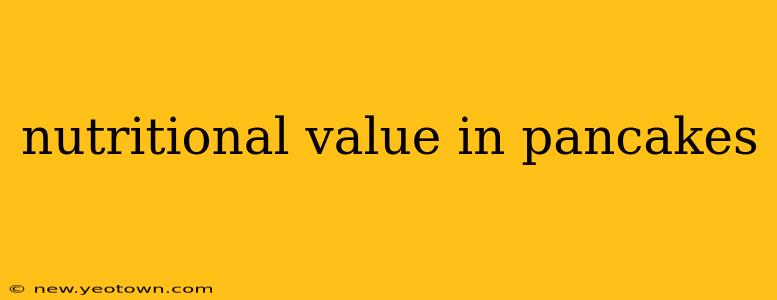Pancakes. The fluffy, golden discs of breakfast bliss. For many, they're synonymous with sugary treats and weekend indulgence. But did you know that these breakfast staples can actually be a surprisingly nutritious part of a balanced diet? It all comes down to the ingredients and how you prepare them. Let's dive into the world of pancake nutrition, uncovering the hidden health benefits and addressing some common concerns.
What is the nutritional value of pancakes?
The nutritional value of pancakes varies wildly depending on the recipe. A simple pancake made with whole wheat flour, milk, eggs, and a touch of sweetener offers a decent source of carbohydrates for energy, along with some protein and healthy fats (depending on the type of milk and additions). However, many recipes laden with refined flour, copious amounts of sugar, and butter drastically alter this profile, resulting in a high-calorie, low-nutrient meal.
Are pancakes healthy?
This is the million-dollar question, and the answer is: it depends. Pancakes themselves aren't inherently unhealthy. The problem lies in the common additions and the ingredients used. A pancake made with whole wheat flour, for example, provides more fiber than one made with refined white flour. Adding fruits like blueberries or bananas boosts the vitamin and antioxidant content. Choosing unsweetened applesauce or mashed banana as a sweetener instead of refined sugar significantly improves the nutritional profile.
What are the benefits of eating pancakes?
When made with wholesome ingredients, pancakes offer several benefits:
- Energy boost: Carbohydrates are the primary fuel source for our bodies, providing sustained energy for your morning.
- Protein intake: Eggs and milk contribute protein, essential for building and repairing tissues.
- Essential vitamins and minerals: Depending on the additions, pancakes can be a source of vitamins like folate (from eggs) and potassium (from bananas).
- Fiber (if made with whole wheat): Whole wheat flour adds fiber, promoting healthy digestion and satiety.
How many calories are in a pancake?
The calorie count of a pancake varies significantly based on its size and ingredients. A small, plain pancake made with whole wheat flour might contain around 100-150 calories. However, this number can easily double or even triple with added butter, syrup, chocolate chips, and other high-calorie ingredients.
Are pancakes good for weight loss?
Pancakes can be part of a weight-loss diet, but moderation is key. Opt for smaller portions, use whole-wheat flour, and minimize added sugars and fats. Focus on incorporating plenty of fruits and vegetables into your meal to increase satiety and nutrient intake. Don't be afraid to experiment with healthier alternatives like using almond flour or oat flour for a lower-calorie, higher-fiber option.
What are some healthy pancake recipes?
The internet is brimming with healthy pancake recipes! Search for "whole wheat pancakes," "oat flour pancakes," or "banana pancakes" to find options that are both delicious and nutritious. Many recipes incorporate fruits, vegetables, nuts, and seeds to enhance the nutritional value further.
How can I make pancakes healthier?
Making healthier pancakes is all about mindful ingredient choices:
- Swap refined flour for whole wheat or alternative flours: This increases fiber and nutrients.
- Reduce sugar: Use less sugar or explore healthier alternatives like mashed banana or applesauce.
- Add fruits and vegetables: Incorporate blueberries, bananas, zucchini, or carrots for added vitamins, minerals, and flavor.
- Use a healthier milk alternative: Consider almond milk, soy milk, or oat milk for added nutrients.
- Control portion sizes: Be mindful of how many pancakes you're eating.
Ultimately, pancakes don't have to be a guilty pleasure. With a little creativity and attention to ingredients, you can enjoy this breakfast classic while still prioritizing your health and well-being. So go ahead, flip those pancakes and enjoy a nutritious and delicious start to your day!

